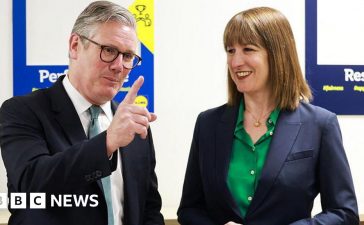UK consumer sentiment hit by budget gloom
UK consumer confidence has been hit by fears over the budget, and the government’s gloomy warnings, a new survey has found.
The British Retail Consortium has reported that households’ assessment of the general economic situation over the next three months has slumped this month.
People are also more worried about their personal financial situation, following heavy hints from Downing Street that October’s budget will include tax rises.
The BRC’s measure of households’ assessment of the general economic situation over the next three months sank to -21 in September from -8 in August.

Older people’s confidence in economic outlook has taken a particular blow, the BRC says – perhaps a sign of the damage caused by the cuts to winter fuel payments for pensioners.
Helen Dickinson, chief executive of the British Retail Consortium, says consumer confidence “fell significantly” in September, adding:
Negative publicity surrounding the state of the UK’s finances appears to have damaged confidence in the economic outlook, particularly among older generations.
Despite this, expectations for future retail spending, while negative, did not yet appear to have been adversely affected, with many consumers expecting to reduce the amount they save instead.
Here’s the details of the BRC’s Consumer Sentiment Monitor:
-
Personal financial situation worsened to -6 in September, down from +1 in August.
-
State of the economy worsened significantly to -21 in September, down from -8 in August.
-
Personal spending on retail, improved slightly to -8 in September, up from -9 in August.
-
Personal spending overall fell to +10 in September, down from +11 in August.
-
Personal saving fell to -9 in September, down from -4 in August.
This is the second survey in less than a week to show a slide in consumer optimism this month.
Last Friday, market research group GfK reported that consumer confidence in the UK has fallen to its lowest since March, amid growing concerns over government plans for a “painful” budget.
Key events
German economy to shrink slightly this year, forecasters predict
Germany’s economy is on track to shrink slightly this year, according to a gloomy new forecast from the country’s leading economic research institutes.
The Joint Economic Forecast Project Group have forecasts that Germany’s GDP will decline by 0.1% during 2024. Six months ago, they predicted it would grow by 0.1%, but have lowered that forecast following signs that the economy is struggling.
For 2025, they have cut their growth forecast to 0.8%, down from 1.4% expected before.
The Group warns that Germany’s economy has been stagnating for more than two years, and it does not expect growth to return to its pre-coronavirus trend for the foreseeable future.
They warn that German factories are suffering from higher energy costs, which is hurting their competitiveness, and increasing competition from high-quality industrial goods from China.
Dr. Geraldine Dany-Knedlik, head of Forecasting and Economic Policy at the German Institute for Economic Research (DIW Berlin), explains:
“In addition to the economic downturn, the German economy is also being weighed down by structural change.”
“Decarbonization, digitalization, and demographic change – alongside stronger competition with companies from China – have triggered structural adjustment processes that are dampening the long-term growth prospects of the German economy.”
Germany’s economy shrank slightly in the second quarter of this year. A second contraction in the current quarter (July-September) would put it into a technical recession.
Musk hits back
Elon Musk has hit back at the UK, following the news that he won’t be on the guest list for next month’s International Investment Summit.
Posting on his social media site, X (formerly Twitter), Musk renews his criticism of the Labour government, posting:
I don’t think anyone should go to the UK when they’re releasing convicted pedophiles in order to imprison people for social media posts.
Must is referring to the prison early release scheme initiated by the new government, which has warned that the system is “on the point of collapse” due to a lack of prison places.
The government initially said the early release scheme would not apply to the most serious offenders, but later confirmed that prisoners who have completed a sentence for a serious crime and are now serving a consecutive sentence for a lesser one would qualify.
Last month, two men were jailed for stirring up hatred and violence online after the Southport attack; one for Facebook posts advocating an attack on a hotel in Leeds, the other for posts on X calling for mass deportation and for people to set fire to hotels housing asylum seekers.
Italian dining chain Prezzo has swooped on beer and pub chain BrewDog to find its next chief executive.
James Brown, CEO of BrewDog Bars, was named as Prezzo’s CEO this morning, after nearly a decade of senior leadership roles at BrewDog.
Prezzo, which opened its first restaurant in London in 2000, offers traditional Italian fare including pizzas, pasta, calzone and spaghetti bolognese (among other offerings).
Brown’s arrival means Prezzo’s current CEO – Dean Challenger – will return to being chief financial officer. Challenger has been credited with stabilising Prezzo after the disruption caused by the Covid-19 pandemic, and returning the company to profitability.
Brown’s departure from BrewDog comes four months after controversial co-founder and chief executive James Watt announced he was stepping down.
Employers’ sentiment on the economy inproves, but remains negative
UK employers remain anxious about the UK’s economic outlook, according to the latest JobsOutlook report from the Recruitment & Employment Confederation (REC).
It has found that employer sentiment on the UK’s economic outlook improved by four points in the last quarter. Although that’s encouraging, the index remains in negative territory at -26.
REC says:
This longer than predicted stretch of economic caution also caused the pace at which firms’ confidence in their own business is improving to moderate a little (to +8). This was particularly driven by a marginal drop in confidence during August.
Overall, the Report shows hiring intentions remain positive for firms. It also shows that SMEs are more optimistic about temp recruitment in the short and medium-term, and some evidence of improving sentiment in London, which is always a labour market bellwether. Turning to temporary labour is a common way of weathering uncertain times for companies.
The rioting that gripped parts of the UK this summer hit takings at pub chain Mitchells & Butlers.
M&B, whose brands include the All Bar One, O’Neill’s, Toby Carvery and Harvester chains, has reported that sales growth slowed in the last eight weeks.
It told shareholders:
The rate of growth in the fourth quarter continues to reflect a progressive easing of the inflationary environment, as well as an unseasonally cool and wet summer period and the disruption caused by riots in city centres during August.
M&B’s like-for-like sales in the eight weeks to 21 September 2024 grew by 2.5%, much slower than the 5.2% growth recorded over the last year.
Some shoppers avoided UK high streets in early August after rioting led to shops being vandalised and looted, while some hospitality venues in parts of the UK closed their doors due to concerns over far-right riots.
Adam Vettese, market analyst at investment platform eToro, says:
“It is often the British way to complain about the weather, but Mitchells and Butlers might have a genuine grievance given they reported a slowdown in growth over the last quarter, in part blamed by the colder and wetter summer. Rioting in August also disrupted trade as pubs may have had to close early or take precautions to prevent damage.
“Almost every sector has felt pressure from inflation and hospitality is no different, all the while wage increases are pushing the cost base in both directions. It’s fair to say the Toby carvery and All Bar One operator has had a fair bit to contend with in that regard.
Swiss National Bank cuts interest rates
Newsflash: Switzerland’s central bank has cut interest rates.
The Swiss National Bank hss announced it has eased monetary policy, by lowering its policy rate to 1.0%, from 1.25%, its third rate cut of the year.
It acted after inflation in Switzerland fell to 1.1% in August, down from 1.4% in May, saying:
Inflationary pressure in Switzerland has again decreased significantly compared to the previous quarter. Among other things, this decrease reflects the appreciation of the Swiss franc over the last three months.
The SNB also hinted that rates could be cut again soon, adding:
The SNB’s easing of monetary policy today takes the reduction in inflationary pressure into account. Further cuts in the SNB policy rate may become necessary in the coming quarters to ensure price stability over the medium term.
The move comes two weeks after the European Central Bank lowered its key rates.
In March, the SNB became the first major central bank to cut interest rates, which it followed up with a second cut in June.
S&P and Moody’s slash Thames Water’s ratings as default fears mount
Confidence in Thames Water’s ability to repay its debts is also falling.
Two credit rating agencies have downgraded Thames Water overnight, concerned that Britain’s largest water provider is running out of money.
S&P lowered its ratings on Thames’s class A and class B debt to ‘CCC+’ and ‘CCC-’ respectively, close to default levels.
It blamed Thames’s announcement last week that it could run out of cash in December unless it can rewrite its loan terms.
S&P says this came as a surprise:
On Sept. 20, 2024, Thames Water Utilities Finance PLC (Thames Water) announced that its liquidity sources only cover its liquidity needs until December 2024, unless it obtains senior creditors’ approval to release £0.38 billion of cash reserved under its financing covenants and unless it can draw on its £0.42 billion revolving credit facility (RCF) line.
This announcement is contrary to our previous expectation in July, based on the company’s disclosure, that liquidity would last the company through May 2025.
Moody’s is also concerned that Thames Water is close to defaulting on its loans.
Moody’s cut Thames Water’s corporate family rating to Caa1 from Ba2, saying:
Today’s downgrade reflects a significantly tighter liquidity position than previously expected and our view that this will likely lead in the near term to a distressed exchange, where creditors agree to some form of amendment or extension of credit terms that results in a loss, or a loss is otherwise imposed on them, relative to the original promise to pay.
A distressed exchange of this type constitutes a default by Moody’s definition. In the medium term, inability to attract new equity funding may ultimately lead to a creditor-led debt restructuring or one that is imposed as part of a special administration process, should the company meet the criteria for special administration to be called.
The fall in consumer confidence means many people are planning to spend less in the shops in the next three months – with fashion, home and garden furniture, DIY and electronics likely to be worse hit.
Many people also plan to spend less dining out, as this chart from the BRC’s Consumer Sentiment Monitor shows:
UK consumer sentiment hit by budget gloom
UK consumer confidence has been hit by fears over the budget, and the government’s gloomy warnings, a new survey has found.
The British Retail Consortium has reported that households’ assessment of the general economic situation over the next three months has slumped this month.
People are also more worried about their personal financial situation, following heavy hints from Downing Street that October’s budget will include tax rises.
The BRC’s measure of households’ assessment of the general economic situation over the next three months sank to -21 in September from -8 in August.
Older people’s confidence in economic outlook has taken a particular blow, the BRC says – perhaps a sign of the damage caused by the cuts to winter fuel payments for pensioners.
Helen Dickinson, chief executive of the British Retail Consortium, says consumer confidence “fell significantly” in September, adding:
Negative publicity surrounding the state of the UK’s finances appears to have damaged confidence in the economic outlook, particularly among older generations.
Despite this, expectations for future retail spending, while negative, did not yet appear to have been adversely affected, with many consumers expecting to reduce the amount they save instead.
Here’s the details of the BRC’s Consumer Sentiment Monitor:
-
Personal financial situation worsened to -6 in September, down from +1 in August.
-
State of the economy worsened significantly to -21 in September, down from -8 in August.
-
Personal spending on retail, improved slightly to -8 in September, up from -9 in August.
-
Personal spending overall fell to +10 in September, down from +11 in August.
-
Personal saving fell to -9 in September, down from -4 in August.
This is the second survey in less than a week to show a slide in consumer optimism this month.
Last Friday, market research group GfK reported that consumer confidence in the UK has fallen to its lowest since March, amid growing concerns over government plans for a “painful” budget.
Elon Musk ‘not invited’ to UK investment summit
Back in the UK, Elon Musk’s comments about this summer’s UK riots have cost him a place at next month’s International Investment Summit, the BBC reports.
The Summit is part of the Labour government’s push to stimulate economic growth, by attracting more spending to the UK, and is expected to take place at a central London location.
The goal is to show that the UK is “open for business” under a new government.
But, the BBC’s Faisal Islam reports that Musk, currently the world’s richest person, has not been invited to the International Investment Summit in response to his social media posts during last month’s riots, explaining:
During the August riots, Mr Musk shared, and later deleted, a conspiracy theory about the UK building “detainment camps” on the Falkland Islands for rioters, on X – the social media platform he owns.
At the time ministers said his comments were “totally unjustifiable” and “pretty deplorable”.
NEW & EXCL 🚨
Tesla owner Elon Musk not invited to next month’s UK Government International Investment Summit, after his social media posts during August riots. Musk made civil war predictions & spread [later deleted] false stories about detainment campshttps://t.co/c2JiewNUaF
— Faisal Islam (@faisalislam) September 25, 2024
Musk was invited to last year’s summit, and attended in a starring role the later AI Summit, including a fireside chat with then PM Rishi Sunak.
He also routinely attends the equivalent summit in France hosted by President Macron.
— Faisal Islam (@faisalislam) September 25, 2024
Last month, Downing Street criticised Musk after he posted on X that “civil war is inevitable” under a video of violent riots in Liverpool.
The Guardian reported earlier this week that business leaders have warned that the global investment summit risks falling flat, amid growing frustrations over high costs of involvement and its timing two weeks before the budget.
Stephen Phipson, the chief executive of Make UK, which represents 20,000 manufacturing firms across the country, said:
“It’s the wrong way round. There is a concern about the timing, coming two weeks before the budget.
People will want to know what the government’s priorities are before committing investment.”
Ukraine growth forecast cut as energy strikes take toll
The European Bank for Reconstruction and Development has also cut its growth forecast for Ukraine, warning that it is taking an economic hit from Russian attacks on its energy infrastructure.
The EBRD lowered its forecast for Ukraine’s economic growth to 4.7% next year from 6% in May due to the attacks, following an expected expansion of 3% this year.
Those attacks are forcing Ukraine to rely on more expensive imports as it builds alternative sources of energy, the EBRD points out/
Their chief economist, Beata Javorcik, told Bloomberg:
“More than half of electricity generation capacity was destroyed.
Now, some of the gap is being filled by imports of electricity from Europe, but this electricity comes at a higher cost. So that puts energy intensive industries at the disadvantage.”
Ukraine is taking an economic hit from Russian attacks on its energy infrastructure, forcing it to rely on more expensive imports, the EBRD says https://t.co/7wcO7uAySu
— Bloomberg Economics (@economics) September 26, 2024
Introduction: EBRD cuts growth forecasts

Phillip Inman
Good morning, and welcome to our rolling coverage of business, the financial markets and the world economy.
Europe is struggling to cope with much higher energy prices than the US and a lack of investment, putting the brakes on growth, the European Bank for Reconstruction and Development (EBRD) has warned.
The bank, which lends to countries across eastern Europe, central Asia and north Africa, revised down its expectations of growth this year and next year, saying many countries would be unable to grow more quickly following a resurgence in gas and electricity prices, my colleague Phillip Inman reports.
While oil prices have stabilised at around the average levels seen between 2017 and 2021, “gas in Europe remains relatively expensive, trading at almost five times the US price, and some economies in the EBRD regions are paying significantly higher average import prices for gas than Germany.” the bank said in its latest Regional Economic Prospects report.
Expected growth across the EBRD region this year was downgraded by 0.2 percentage points from a previous forecast in May to 2.8%.
In 2025, it expects growth of 3.5%, 0.1 percentage point below the previous projection.
“Our economies are steadily adjusting to evolving global dynamics,” said Beata Javorcik, the EBRD’s chief economist.
“The easing of inflation and recovery in real wages offer encouraging signs.”
However, “ongoing vigilance” would be required as economies adapt to renewed inflationary pressures, concerns about energy security following a flare-up in the middle east conflict, trade wars and high interest rates.
Javorcik said high energy prices and a lack of investment had brought Europe to a “crisis point”.
Earlier this month Mario Draghi, a former prime minister of Italy, told EU leaders they needed to club together and spend about 4.5% of the economic bloc’s annual income on investment to boost long term growth prospects.
Javorcik said the report, which was dismissed by German finance minister Christian Lindner, would provide the basis for a discussion about Europe’s competitiveness and the need for investment finance across all 27 EU nations.
The agenda
-
7am BST: German consumer sentiment report from GfK
-
8.30am BST: Switzerlan’s central bank sets interest rates
-
1.30pm BST: US GDP report for Q2 2024 (final reading)
-
2.20pm BST: Federal Reserve chair Jerome Powell to speak at the 2024 US Treasury Market Conference in New York
-
2.30pm BST: ECB president Christine Lagarde speech at a conference on “New Frontiers in Macroprudential Policy” in Frankfurt.








